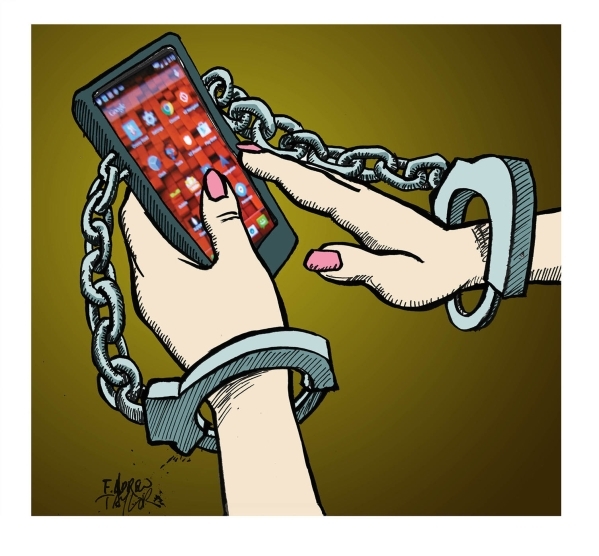Smartphones, social media often act as a crutch
Editors note: This is part two of a two-part Addiction Series story on technology addiction.
Oscar Sida, instructor and Human Services Program coordinator at UNLV, has noticed that for many people, their smartphone has become an addiction.
"I was at a movie the other day, and I saw a woman who kept pulling out her cellphone," he said. "It looked like it was just compulsive for her. It is something people use to reduce anxiety. The problem is that there are styles of coping that cause more problems than they alleviate."
The hand-held devices, created as a tool to help and entertain, have become not a means to an end but the end itself.
"I think more people don't recognize technology addiction as a problem because it might not seem as obviously destructive as something like problem gambling," Sida said. "Smartphones, social media and other forms of technology can become akin to destructive gambling, binge eating and binge drinking."
"People have become codependent of their phones," said Danielle Moreggi, a clinical psychologist and director of counseling and psychological services and disability resources at the College of Southern Nevada. "They say things like, 'I don't know what to do because I don't have my phone,' or 'I wasn't reminded because I didn't have my phone.' Having the technology in the palm of our hand has taken away even the thought process of trying another route because we're so used to having it."
The trend has led to a general disconnect in which people will often be somewhere together physically but all in their separate little worlds through their phones.
"It's the addiction part of Facebook and games," Moreggi said. "They give someone a chance to check out without leaving the room. People are addicted to the phone because they are addicted to the stimulation and don't want to be where they are."
While games and online social networks aren't always a problem, Moreggi believes users should ask themselves a few questions to determine if the use has become destructive behavior.
"What is the person getting out of it?" she asked. "Escape? Yes. Do they feel anxious when they're not doing it? Yes. Do they feel that if they don't have it, they'll have to turn to something else? Yes. That's really more indicative of an addiction."
She notes that often when people get addicted, they get lost in how they got there. She doesn't see this as a simple problem or one that is going away anytime soon.
"I think we have a bigger battle on our hands because the culture that we live in right now demands from us that we have access to technology all of the time," Moreggi said. "We're afraid if we don't, we're going to get left behind. We see people having trouble managing their time because they're spending so much of it on their phone that they don't even realize how much time that is. They're not getting to do other things."
Both Moreggi and Sida recommend at the very least taking stock of the time one spends using technology and exploring the reasons why.
"No one wakes up and says, 'I'm going to become addicted to heroin,' and no one wakes up and says, 'I'm going to be addicted to my cellphone,' but it happens," Moreggi said.
— To reach East Valley View reporter F. Andrew Taylor, email ataylor@viewnews.com or call 702-380-4532.
Addiction Series
View plans to spend the next several months exploring the topic of addictions in Sin City in a bi-monthly series that will cover everything from alcohol and food to technology and shopping. Watch for the next Addiction Series story in the Sept. 3 issue, with a look at workaholics.

















